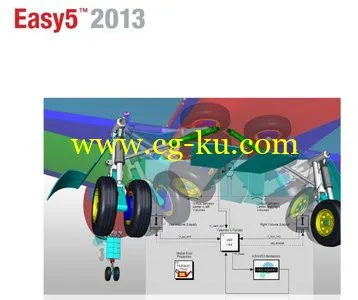
MSC Easy5是一套面向控制系统和多学科动态系统的仿真软件,用于在产品的概念和系统级设计阶段快速地建立完整、可靠的功能虚拟样机。
飞机工程,汽车,农业设备和其他复杂的系统需要一个系统工程的做法,不仅仅是组件和子系统,整体的系统作为一个整体都进行了测试。传统的建立和测试方法是费时和昂贵的,而现在比以往任何时候,每一个行业都面临前所未有的挑战,以应付不断增加的创新矛盾的要求,同时降低成本和缩短上市时间。
Easy5提供准确,可靠的多领域建模和动态物理系统模拟。利用Easy5,一些世界上最著名的公司正在用计算机辅助工程(CAE)评估系统层次性能,减少物理原型,降低成本,加快产品开发进程。
动力系统,这些系统的时间函数的行为是很重要的,一般是指使用一阶微分(或差分)方程。Easy5通过利用图形,基于原理图的应用,提供一套综合全面的预包装“组件”,储存在特定应用程序库中,从而简化了该类系统的建设和分析,以及简化了该类系统的组装和模拟。系统工程师在一个熟悉的示意图环境中工作,对直观的,易于使用的,多层次的分层建模环境中的部件,增加和指定简单但复杂的组件之间的连接。
Easy5的典型应用包括控制系统,液压系统(包括热效应),气动,气体流动,热,电,机械,制冷,环境控制,润滑或燃油系统,和抽样数据/离散时间行为。
Easy5的功能:
热液压:制动系统,动力换挡变速箱系统,防锁死刹车系统,起落架,燃料喷射系统,主动制导悬架系统,润滑系统
气体动力学:气动,推进力,消毒,空气和蒸汽循环,高压气体,气体传输,吸附,气相反应,暖通空调,发动机调节系统,多品种气体系统
多相流体:制冷,空调,气候控制,低温管道网络,蒸汽/水系统,特殊燃料系统,易挥发液体。
系统控制硬件和软件评价(数据采集的采样率,异步通信,模拟和数字电子过滤器,控制回路的执行率,网络(CAN)总线通信等)
燃料电池:固定的或移动的。
电气系统:交流/直流电机,电力电子学,电池等。飞行动力学,以及所有类型的控制系统,包括数字滤波器控制系统
Msc Easy5 V2015 (x64) | 299 MB
Easy5 Advanced Controls & Systems Simulation Accurately simulate control systems, hydraulics (including thermal effects), pneumatics, gaseous flow, thermal, electrical, mechanical, refrigeration, environment control, lubrication or fuel systems, and sampled-data/discrete-time behavior.
Engineering aircraft, vehicles, agricultural equipment, and other complex systems requires a systems-engineering approach in which not only the components and subsystems but the entire system as a whole is tested. Traditional build and test methodologies are time-consuming and expensive; and now more than ever, every industry is challenged to meet the conflicting requirements of increasing innovation while reducing cost and time to market.
Dynamic systems, those systems whose behavior as a function of time is important, are typically defined using first-order differential (or difference) equations. Easy5 simplifies the construction and analysis of such systems by means of a graphical, schematic-based application, offering a comprehensive set of pre-packaged "components", stored in application-specific libraries, to simplify the assembly and simulation of such systems. Systems engineers work within a familiar schematic drawing environment to add and specify simple, yet complex, connections between components in an intuitive, simple-to-use, multi-level hierarchical modelling environment.
Capabilities:
Thermal hydraulics: actuation systems, power shift transmission systems, anti-lock braking systems, landing gear, fuel injection systems, active suspension systems, lubrication systems
Gas dynamics: pneumatics, propulsion, sterilization, air and steam cycles, high-pressure gas, gas transmission, adsorption, gas phase reactions, HVAC, ECS, multi-species gaseous systems
Multiphase fluids: refrigeration, air-conditioning, climate control, cryogenic piping networks, steam/water systems, or fuel systems with exotic, volatile fluids.
Systems control hardware and software evaluation (data acquisition sampling rates, asynchronous communication, analog and digital electronic filters, control loop execution rates, network (CAN) bus communication, etc.)
Fuel cells: stationary or mobile.
Electrical systems: AC/DC machines, power electronics, batteries, etc. Flight dynamics, and control systems of all kinds including digital filters